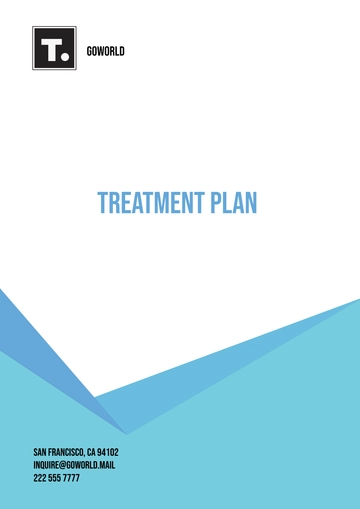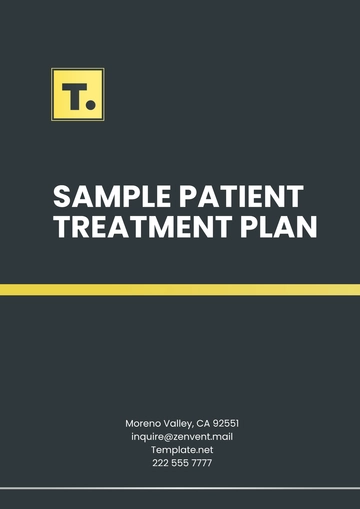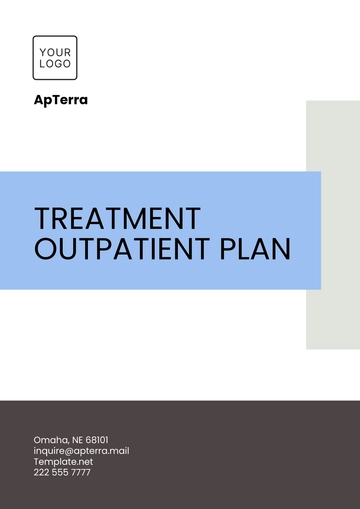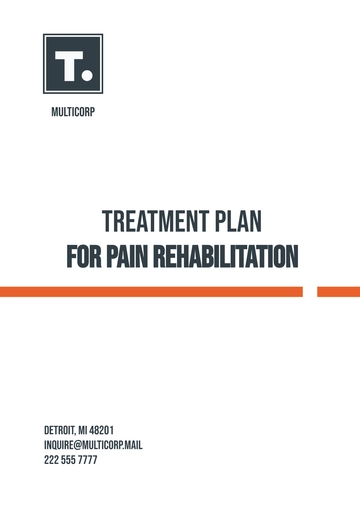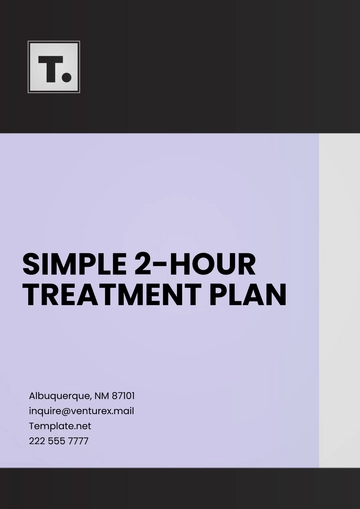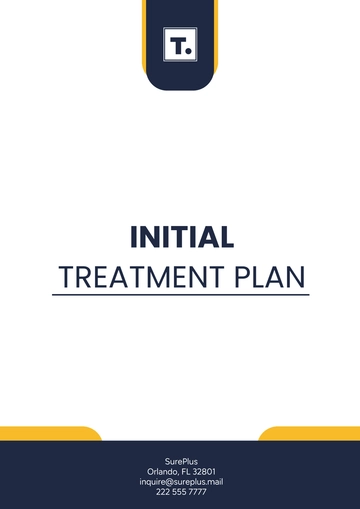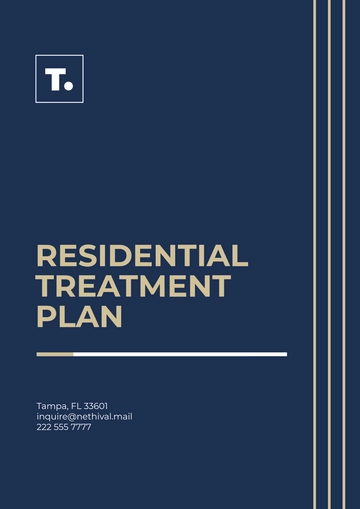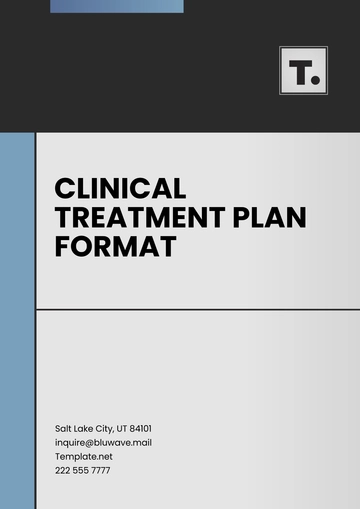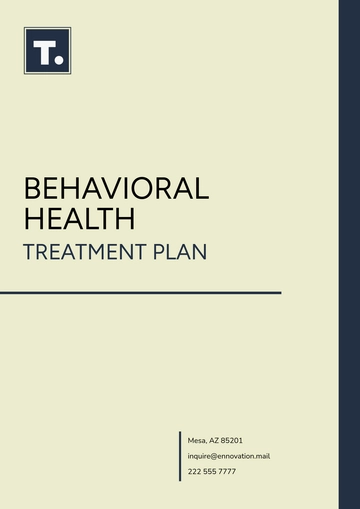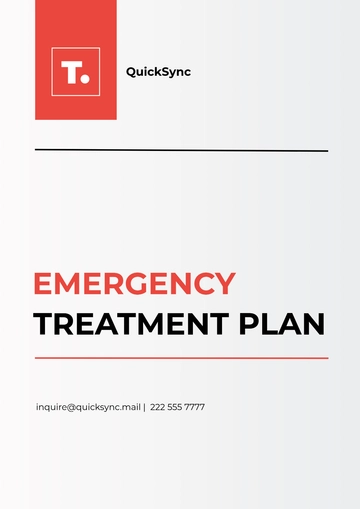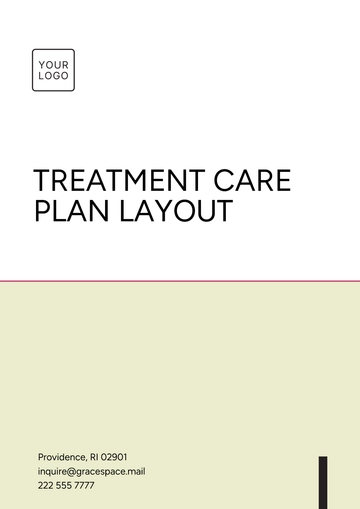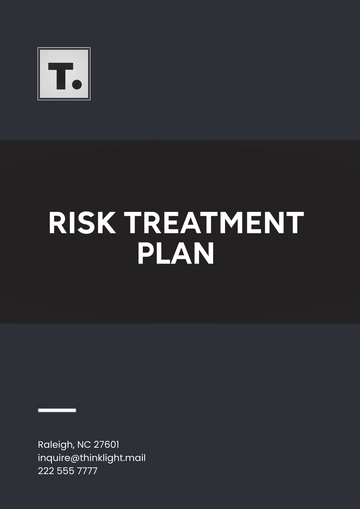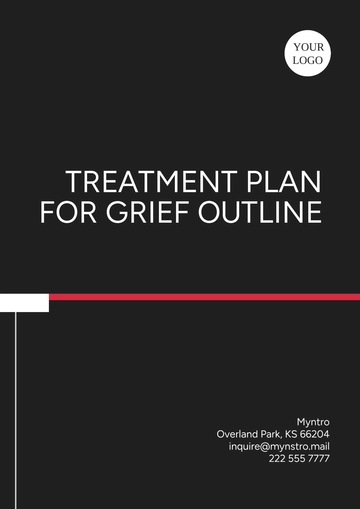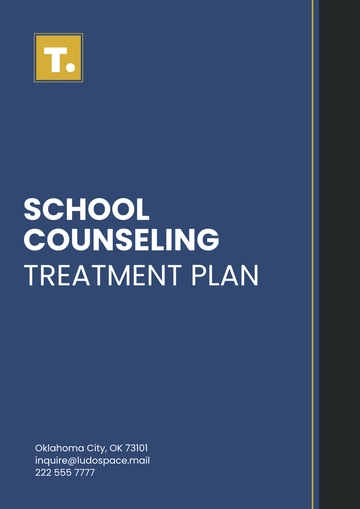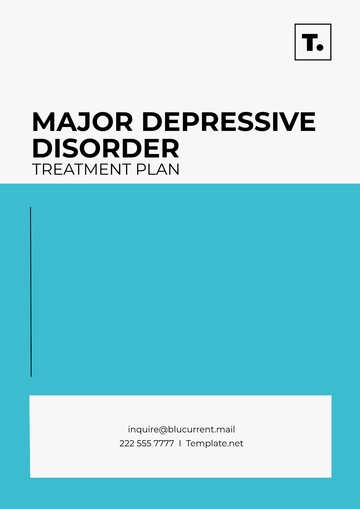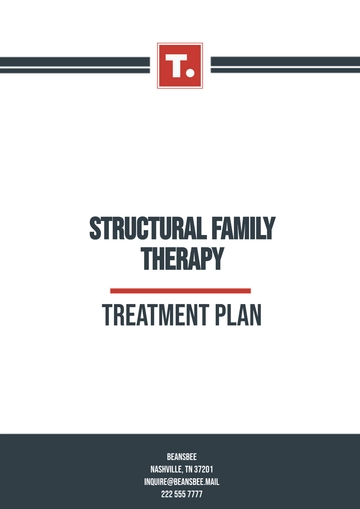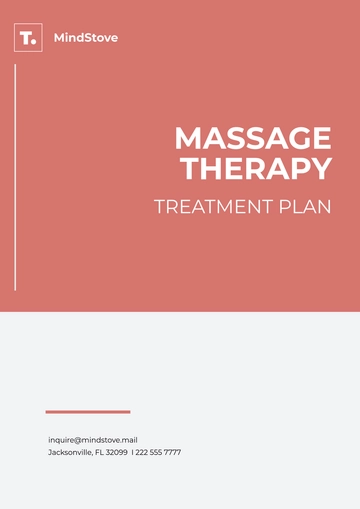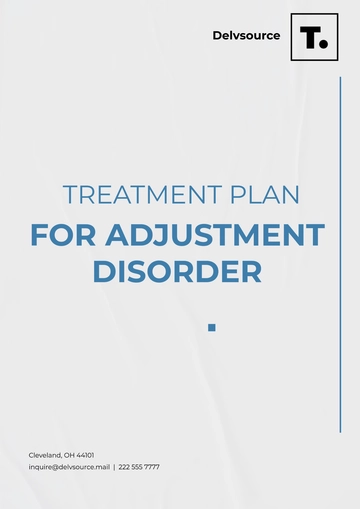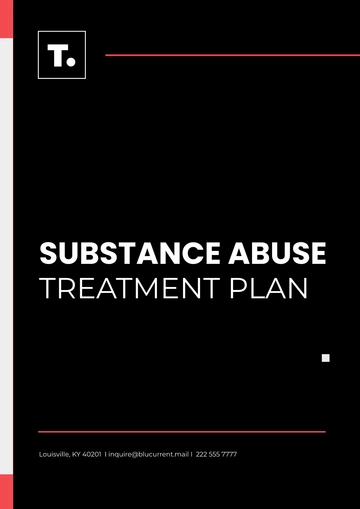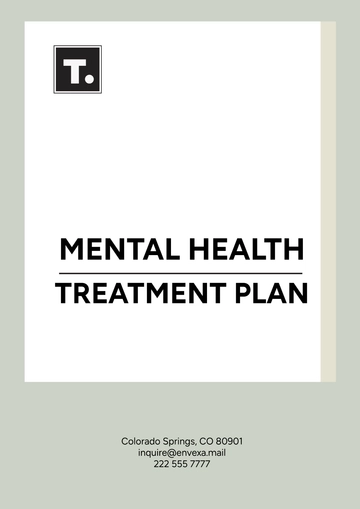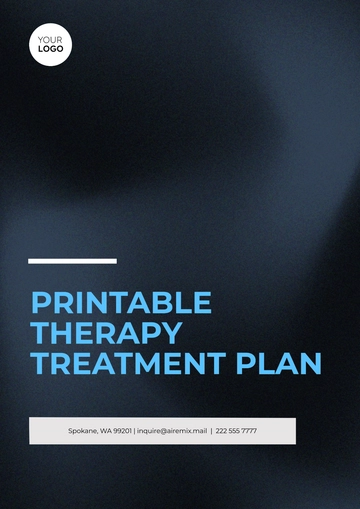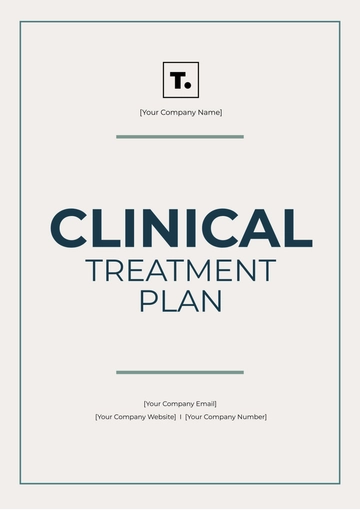Free Residential Treatment Plan
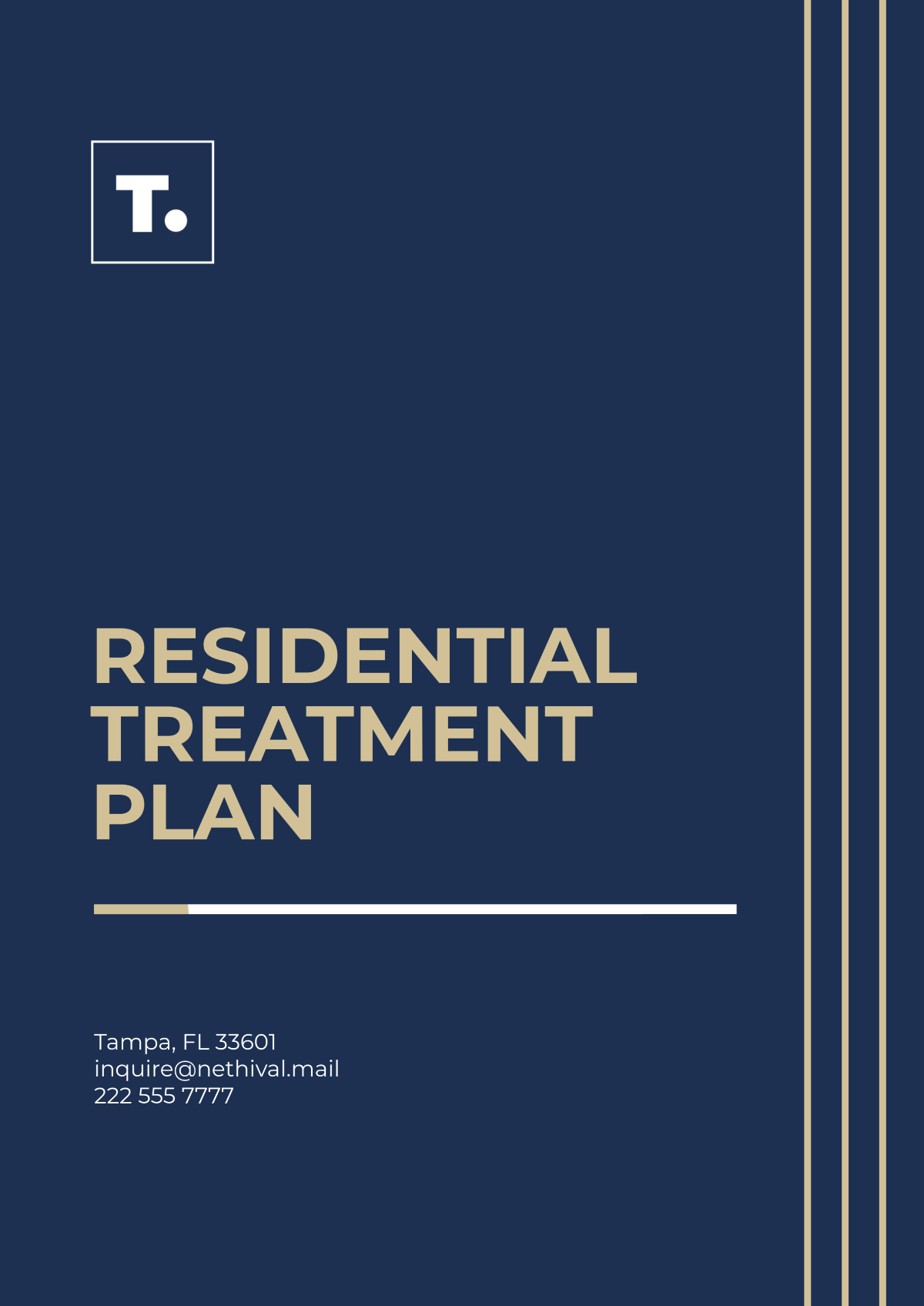
Prepared by: [Your Name]
Patient's Name: Sarah Doe
Address: Milwaukee, WI 53202
I. Patient Background
Sarah is a 15-year-old adolescent who has been experiencing significant behavioral problems both at home and at school. She exhibits aggressive outbursts, defiance towards authority figures, and difficulty managing her emotions. Sarah's behavior has led to conflicts with family members, frequent suspensions from school, and concerns about her safety and well-being.
II. Assessment
Sarah is subject to a comprehensive assessment conducted by a team of mental health professionals, including psychologists, social workers, and behavioral therapists. The assessment reveals that Sarah has been diagnosed with a disruptive behavior disorder, possibly oppositional defiant disorder (ODD), characterized by patterns of negative, hostile, and defiant behavior.
III. Treatment Plan
Behavioral Therapy: Sarah participates in individual and group therapy sessions focused on cognitive-behavioral techniques to identify triggers for her behavior, develop coping strategies, and improve social skills and problem-solving abilities.
Family Therapy: Sarah's family members are actively involved in her treatment process, participating in family therapy sessions to improve communication, set boundaries, and develop effective parenting strategies to support Sarah's behavior management at home.
Skill-Building Activities: Sarah engages in structured activities aimed at building self-esteem, emotional regulation, and conflict resolution skills, such as art therapy, mindfulness exercises, and recreational therapy.
Academic Support: Sarah receives academic support and tutoring services to address any educational challenges she may be facing and to ensure continuity of her learning during her residential stay.
Structured Environment: Sarah resides in a structured and supervised residential facility where consistent routines, clear expectations, and positive reinforcement techniques are implemented to promote a safe and supportive environment for her growth and development.
Psychiatric Evaluation and Medication Management: Sarah undergoes a psychiatric evaluation to assess the need for medication to manage her symptoms. If deemed necessary, she receives medication management under the supervision of a psychiatrist to complement her behavioral therapy.
IV. Implementation
Sarah enters the residential treatment facility where she receives personalized care and support from a multidisciplinary team of mental health professionals. She actively participates in therapy sessions, engages in skill-building activities, and collaborates with her treatment team to work towards her behavioral goals.
V. Residential Treatment Plan Timeline
Phase | Duration | Activities |
|---|---|---|
Assessment | 1 week | Conduct comprehensive assessments including interviews, psychological evaluations, and behavioral assessments |
Treatment Planning | 1 week | Develop an individualized treatment plan based on assessment findings |
Intake and Admission | 1 day | Complete paperwork, orientation to the facility, and introduction to the treatment team |
Initial Stabilization | 1-2 weeks | Implement medically supervised detoxification (if necessary) and stabilize the client's condition |
Behavioral Therapy | Ongoing | Participate in individual and group therapy sessions focusing on cognitive-behavioral techniques |
Family Therapy | Weekly sessions | Engage in family therapy sessions to improve communication and develop effective parenting strategies |
Skill-Building Activities | Daily | Participate in structured activities to build self-esteem, emotional regulation, and social skills |
Academic Support | Ongoing | Receive academic support and tutoring services to address educational challenges |
Medication Management | As needed | Undergo psychiatric evaluation and receive medication management under the supervision of a psychiatrist |
Transition Planning | Last 2 weeks of the program | Develop aftercare plan including outpatient therapy, support group participation, and community resources |
VI. Monitoring and Review
Sarah's progress is closely monitored and evaluated by her treatment team through ongoing assessments, behavioral observations, and feedback from family members and school personnel. Progress reviews are conducted regularly to assess the effectiveness of the Residential Treatment Plan and make adjustments as needed to support Sarah's continued growth and development.
VII. Conclusion
Through the Residential Treatment Plan, Sarah receives specialized care and support tailored to her unique needs, empowering her to overcome behavioral challenges, improve her emotional well-being, and build positive relationships with others. The structured and therapeutic environment of the residential facility provides Sarah with the necessary tools and resources to thrive and succeed in her journey toward behavioral health.
- 100% Customizable, free editor
- Access 1 Million+ Templates, photo’s & graphics
- Download or share as a template
- Click and replace photos, graphics, text, backgrounds
- Resize, crop, AI write & more
- Access advanced editor
Improve the care provided in residential settings with the Residential Treatment Plan Template offered by Template.net. This customizable and downloadable template supports detailed planning for individualized care in residential facilities. Editable in our AI Editor Tool, it can be tailored to meet the specific needs of each resident. Print your comprehensive plans to ensure high-quality, consistent care and improved resident outcomes.
You may also like
- Finance Plan
- Construction Plan
- Sales Plan
- Development Plan
- Career Plan
- Budget Plan
- HR Plan
- Education Plan
- Transition Plan
- Work Plan
- Training Plan
- Communication Plan
- Operation Plan
- Health And Safety Plan
- Strategy Plan
- Professional Development Plan
- Advertising Plan
- Risk Management Plan
- Restaurant Plan
- School Plan
- Nursing Home Patient Care Plan
- Nursing Care Plan
- Plan Event
- Startup Plan
- Social Media Plan
- Staffing Plan
- Annual Plan
- Content Plan
- Payment Plan
- Implementation Plan
- Hotel Plan
- Workout Plan
- Accounting Plan
- Campaign Plan
- Essay Plan
- 30 60 90 Day Plan
- Research Plan
- Recruitment Plan
- 90 Day Plan
- Quarterly Plan
- Emergency Plan
- 5 Year Plan
- Gym Plan
- Personal Plan
- IT and Software Plan
- Treatment Plan
- Real Estate Plan
- Law Firm Plan
- Healthcare Plan
- Improvement Plan
- Media Plan
- 5 Year Business Plan
- Learning Plan
- Marketing Campaign Plan
- Travel Agency Plan
- Cleaning Services Plan
- Interior Design Plan
- Performance Plan
- PR Plan
- Birth Plan
- Life Plan
- SEO Plan
- Disaster Recovery Plan
- Continuity Plan
- Launch Plan
- Legal Plan
- Behavior Plan
- Performance Improvement Plan
- Salon Plan
- Security Plan
- Security Management Plan
- Employee Development Plan
- Quality Plan
- Service Improvement Plan
- Growth Plan
- Incident Response Plan
- Basketball Plan
- Emergency Action Plan
- Product Launch Plan
- Spa Plan
- Employee Training Plan
- Data Analysis Plan
- Employee Action Plan
- Territory Plan
- Audit Plan
- Classroom Plan
- Activity Plan
- Parenting Plan
- Care Plan
- Project Execution Plan
- Exercise Plan
- Internship Plan
- Software Development Plan
- Continuous Improvement Plan
- Leave Plan
- 90 Day Sales Plan
- Advertising Agency Plan
- Employee Transition Plan
- Smart Action Plan
- Workplace Safety Plan
- Behavior Change Plan
- Contingency Plan
- Continuity of Operations Plan
- Health Plan
- Quality Control Plan
- Self Plan
- Sports Development Plan
- Change Management Plan
- Ecommerce Plan
- Personal Financial Plan
- Process Improvement Plan
- 30-60-90 Day Sales Plan
- Crisis Management Plan
- Engagement Plan
- Execution Plan
- Pandemic Plan
- Quality Assurance Plan
- Service Continuity Plan
- Agile Project Plan
- Fundraising Plan
- Job Transition Plan
- Asset Maintenance Plan
- Maintenance Plan
- Software Test Plan
- Staff Training and Development Plan
- 3 Year Plan
- Brand Activation Plan
- Release Plan
- Resource Plan
- Risk Mitigation Plan
- Teacher Plan
- 30 60 90 Day Plan for New Manager
- Food Safety Plan
- Food Truck Plan
- Hiring Plan
- Quality Management Plan
- Wellness Plan
- Behavior Intervention Plan
- Bonus Plan
- Investment Plan
- Maternity Leave Plan
- Pandemic Response Plan
- Succession Planning
- Coaching Plan
- Configuration Management Plan
- Remote Work Plan
- Self Care Plan
- Teaching Plan
- 100-Day Plan
- HACCP Plan
- Student Plan
- Sustainability Plan
- 30 60 90 Day Plan for Interview
- Access Plan
- Site Specific Safety Plan
